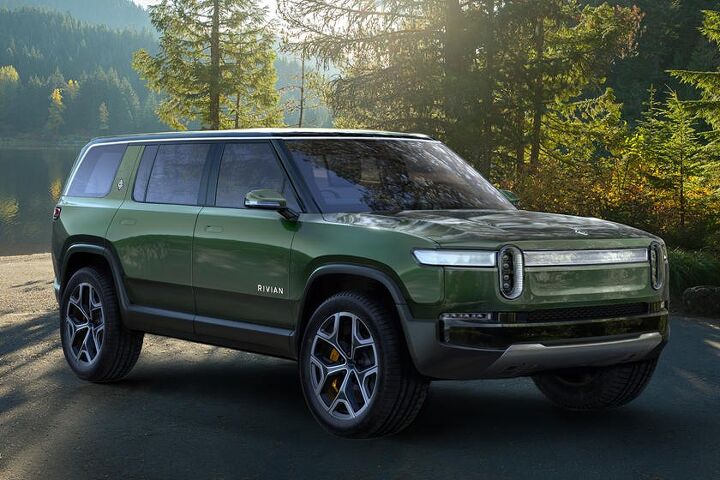Bark's Bites: Cox Automotive's Investment In Rivian Speaks Volumes About The Future

Full disclosure time: For those who are new around here, I worked at Cox Automotive for a little over four years as a sales trainer in the Media Sales division. In that role, I was (very) peripherally aware of some of the company’s strategic decisions, as the Sales Strategy team was also part of my larger department, but I didn’t have any influence or advance knowledge of them. (This is a boilerplate statement for when my old friends at Cox decide I’m in violation of my employment termination agreement by writing this.)
When I first started at Cox (before they even called it “Cox Automotive,” it was just Autotrader.com then), the company was a fat cat, to say the least. I remember when one of our leadership team members declared that we had sold $1.2 billion of revenue in a year, and that over $700 million of it was pure profit. I remember when we drastically overpaid for Dealer.com and Dealertrack at a whopping $4 billion dollar pricetag, just because we had the cash laying around and we were going to get heavily taxed on it if we didn’t spend it on something.
Of course, everything has an expiration date, and the third-party automotive classified business was no exception. Around 2016 or so, consumers started using this new thing called “Google” to search for cars on the internet, dealers stopped writing five-figure checks for classified ads every month without even asking why, and sales reps learned that they aren’t actually worth $250,000 a year for just “checking in” on dealers. Their strategy of diversification, with the purchases of companies like Kelley Blue Book, vAuto, and VinSolutions turned out to have been a smart move, as some of their competitors like Cars.com were stuck holding the note on a company that literally nobody wants. Ouch.
So when I read that Cox Automotive had invested $350 million into Rivian last week, my initial thoughts were, “Oh, there goes Cox burning some more cash,” and I mostly went about my day. However, a week later, I’m beginning to see that there are more wheels in motion than anybody on the outside realizes — and they will have a significant impact on the automotive marketplace in the years to come.
Before I dive in, It’s important to understand the typical dealer’s opinion of the 800-pound gorilla that is Cox Automotive. Many, if not most, dealers genuinely dislike dealing with Cox, but they feel that they don’t have any choice. Dealer.com is one of the four approved vendors for websites with both General Motors and Ford, and one of the few approved CDJR solutions for co-op SEM approval. vAuto is the only pricing software that most serious dealers even consider using. Manheim owns and operates the majority of the auctions in the country. And while Autotrader doesn’t work like it used to, most dealers are still afraid to cut off that lead source (yes, you are too a lead source, Autotrader) entirely. Working with any of these companies involves stroking a hefty check to the not-so-jolly giant in Atlanta that is Cox Automotive.
As a result, dealers have a million conspiracy theories about the algorithms on Autotrader and Kelley Blue Book when it comes to displaying inventory. Autotrader used to default to a “price high-low” result on any inventory search, but cars are now sorted by “relevance.” Despite many reassurances to the contrary, dealers insist that there is a way to buy your way to the top of the relevancy search. (You can buy a spotlight ad, which are less obviously “paid ads” than they used to be.) I have heard dealers say that Autotrader gives favorable placement to certain OEMs because they spend more on advertising, etc.
By aligning themselves with Rivian specifically (and Ford tangentially, thanks to Ford’s huge investment in Rivian), Cox is opening themselves up to all sorts of accusations of unfair placement and preferential treatment — not only on the Autotrader and Kelley Blue Book classifieds, but perhaps in vAuto pricing suggestions, KBB valuations…the list goes on forever in the ways that Cox, as a parent company, can and perhaps even does manipulate the automotive retail space.
So what does that mean? To this industry analyst’s eyes and ears, it means that they’ve seen the future, and that it ain’t in listing cars in classified ads. Sure, that’s how they make a good portion of their money now, but that market is forever shrinking and shrinking as SEM and display advertising continues to make up more and more of any dealer’s digital advertising budget.
Pay specific attention to this quote from Automotive News piece, as well.
Rivian and Cox Automotive also said they will explore “partnership opportunities in service operations, logistics and digital retailing.”
To me, this means that Cox is interested in managing and operating a rental fleet for Rivian with their newly acquired company, Pivet. It could also meant that they’re interested in selling subscriptions through their subsidiary, Clutch. What it also definitely means is that they’re not focused on selling Rivian vehicles on Autotrader.com — at least not in any volume. It means that they’re willing to damage their currently agnostic position in the marketplace to take the risk on Rivian being something really, really big.
For all of its flaws, Cox Automotive doesn’t often guess wrong (MakeMyDeal, anyone?). They typically buy the best company in any space and invest heavily in it, with both capital and people. But the $350M? That’s not the investment risk here — that’s frankly about 4-5 months of profit for the Automotive division, and even less of Cox Enterprises’ profit, as a whole. The risk is the potential perceived hit to their other brands. So for them to be taking this risk means that they believe in Rivian in a big, big way.
And if they do, maybe we should, too.
[Image: Rivian]

More by Mark "Bark M." Baruth
Latest Car Reviews
Read moreLatest Product Reviews
Read moreRecent Comments
- Tassos Newsmaxx tells me sustainability is a euphemism for socialism.
- Redapple2 Pass.1 profile pix shows massive C pillar.2 looks too much like trax.3 low mount headlamps4 1.5 turbo set to expire at 78,000 miles.5 33% US content. Hecho Mexico.
- Lou_BC "wait until 30 minutes after eating" My strategy for reading TTAC ;)
- THX1136 "Meet the new boss, same as the old boss" P. Townsend
- Bankerdanny I used to love the Chicago show. I went to my first one around 1980 and didn't miss it for another 20 years. After college I would take some vacation time so I could go mid-week when the show was less crowded. But I think I have only gone twice in the past 10 years. There just isn't much that interests me any more and the Detroit 3 started emphasizing the Detroit show over Chicago, so we weren't getting the big debuts like we used to. Ticket prices are ridiculous and food and drink charges are slices of pizza at steak prices.


































Comments
Join the conversation
EVs are being designed to enable the OEMs to convert their sales model from single event sales/service to subscription service(s). Even if customers choose to buy an EV, many optional features (including charging) will be available through subscriptions. It appears that Cox has figured this out and is keen to apply their connected everywhere experience to be the subscription delivery service to a market newcomer.
If you ever get the opportunity to visit a Manheim auction in progress, take it. (Also ask for a quick walk-through of their reconditioning operation.)